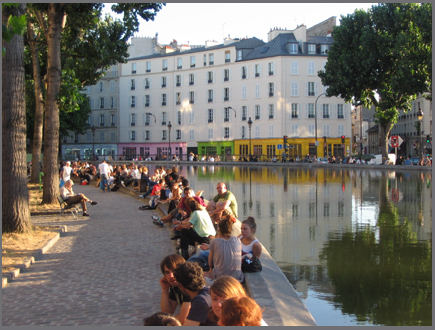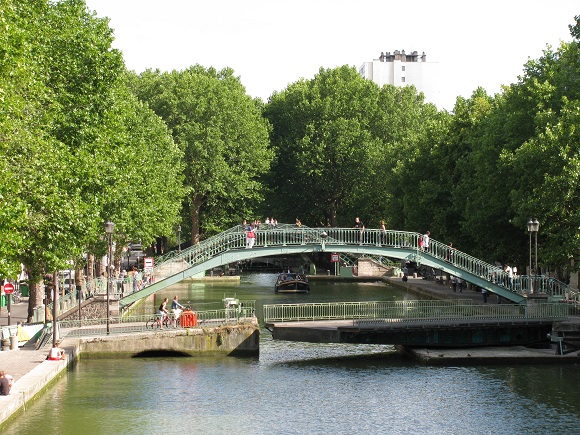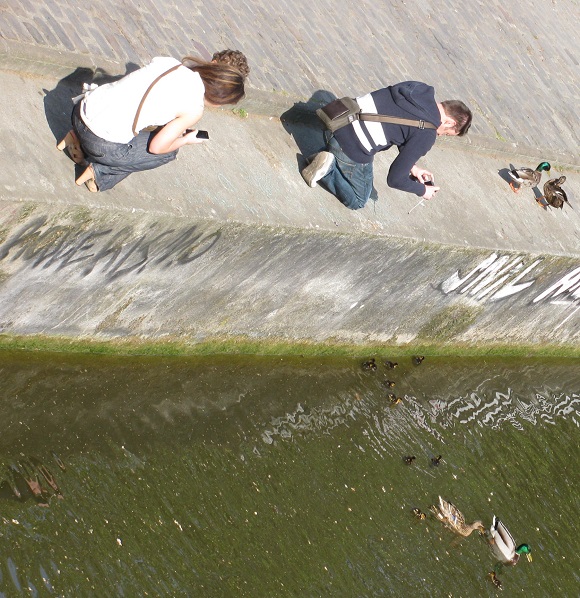
A message from Sue arrived today through the website: “My husband Phil and I are considering visiting Paris this winter… I’m wondering if I’m concerned that the French are so anti-American?”
I’m not sure whether to take that as a question, a comment, or a thought bubble, but the grammar seems sincere enough to warrant a response.
It’s been a while since I’ve received such a thought bubble. I used to get plenty in 2003, when, with perfect timing, my guide to Paris was published just as our troops were gathering on the Iraqi border, without a French platoon in sight. But our national psyche was unable to sustain the Freedom-fried outrage, and now I’m once again more likely to be asked what I think of a restaurant that’s just been written up in The New York Times. So I’m glad to have another shot at the anti-American bubble in less antagonistic times.
I look out the window to the people on the street, wondering if they are as scary or potentially dangerous as Sue might imagine. It’s a surprisingly warm and sunny October Sunday afternoon. From my 4th-floor corner apartment I have an unhurried view of browning linden leaves and beyond them Canal Saint-Martin, where tour boats pass by and where cobblestone quays stir with pedestrians flocking to the Sunday pedestrian zone that starts at the next block. From here there doesn’t appear to be much anti-anything out there.
I live in Boboland, one of several in the eastern arrondissements of Paris. Bobo is the millennial term to describe 30-40-somethings who work in the more or less creative fields of film, fashion, advertising, etc. and who seek both a bourgeois sense of comfort and a bohemian sense of lifestyle. (I moved to the area in 1998, so I don’t deny the attraction.) The term isn’t quite dated yet, but with real estate prices climbing, the balance between the two bos has definitely shifted to the former.
Change in the quarter seemed fast for a few years there, with a new café or restaurant or hip shop opening every month and ever increasing crowds coming to picnic, party, or promenade along the canal. But for most people la bohème is just a way station en route to responsibility or resignation. Oh, we’ve still got the spirit in this quarter, but we’ve also now got the babies. The number of children in the neighborhood has, by my unofficial count, now surpassed the number of dogs. Come to think of it, I haven’t been stepping in much dog doo at all lately, which leads me to suspect not that the city’s threat of a 183 euro fine for failing to curb one’s chien has been a successful deterrent but that there might be a connection between the arrival of babies in the quarter and a recent report of overcrowding at the SPCA.
Meanwhile, the battle between strollers and bikes in the tiny entrance to my building was won by the strollers over a year ago. For a while that banished our bikes upstairs, which caused track marks along the circular stairwell as though it were the scene of a roller derby. We were eventually given keys to a room on the ground floor where we could store bicycles and strollers, though I notice that tricycles are now taking over. My neighbor still blames me for all the track marks on the stairwell, but I don’t think that has anything to do with me being American or him French, Sue. I think it’s just because he’s an asshole.
In fact, as I look out my window it’s hard to imagine anyone out there being dangerously anti-American when they’re all so busy looking for an open café table, or photographing ducks or telling their children to look straight ahead as they pedal their tricycles. But I know that isn’t an adequate response, Sue.
At least Sue’s thought bubble leaves room for an answer. During the they’re-either-with-us-or-against-us heydays of 2003, when I was giving lectures and holding book events in the US, people would actually come up to me to receive my blessing for not going to France that year. One woman practically pleaded with me to accept that she loved Paris but couldn’t go because “what would the neighbors think?” Once, a couple approached me looking as though were making a condolence call, and the man said, “We were going to go to France this year but the time isn’t right.” They were going to Italy instead. I didn’t tell them that in Rome alone they would see a million rainbow flags flying from windows reading PACE (PEACE)—anyway, they had such kind, sad, pasty faces that they’d probably think those were get-well messages to the Pope from the TGLB community. I was invited to speak at a country club in the Philadelphia area that year, only to have the invitation withdrawn because a talk about France would be, in a word, “inappropriate,” followed by a country-club smile saying, “You understand, right?” And then there were the American Jewish travelers who told me that they couldn’t travel to anti-Semitic France (home, nonetheless, of Western Europe’s largest Jewish population) “as a matter of principle,” which I would accept as a bar-mitzvah boy myself were it not for the fact that their principles then tended to steer them to England, European capital of radical Islamic politics.
Bon voyage, I say.
But these are different times on both sides of the Atlantic. The French are as much at a loss about what to say about Iraq and the world order as we are. We remain amusingly different cultures, yet their left-wing opposition has no more umph in it than our own; they, too, need economic or natural disaster to put some wind in their sails. And their right wing is as focused on maintaining power for power’s sake as our own; they just don’t pray for it as loud.
To be sure, anti-Americanism and anti-Semitism exist in France. I make no apologies. Yet most travelers have so little contact with anyone outside of the service industry that they should consider themselves privileged if they actually get into a conversation with someone on either topic.
Safety first, of course, but since when did we require so much certitude when traveling? Since when did we need to be loved on the road? What happened to curiosity, to discovery, to individuals encountering individuals, to finding yourself so bursting with thought bubbles that you want to engage?
Engage, Sue, that’s my advice. Engage—then deal with it.
The linden leaves are now blowing in the evening breeze. Car traffic along the canal has picked up. Sweatered dinner picnickers are gathering on canal’s edge. Men and women are carrying kids and tricycles home.
On their way they may overhear Americans walking nearby. They may look on us kindly. They may want to help us find our way. They may shake their heads at the thought that ours are the faces of the Superpower. In any case, they will invariably find us naïve, overcheerful, and overfed. So be it. For Parisians, we are easy to notice and easy to ignore, and when it comes down to it they don’t believe that we, as individual travelers, have any more influence over government’s policies than they do over theirs.
Now that, dear Sue, is something to be afraid of.
© 2005 by Gary Lee Kraut



